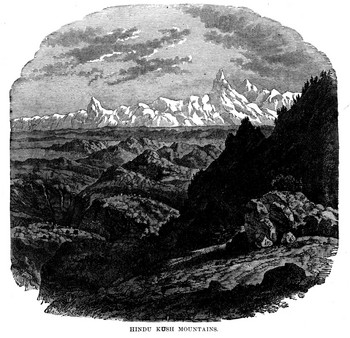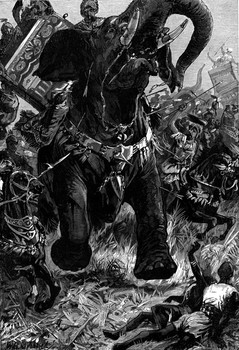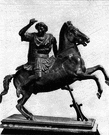|
|

The Life and Successes of Alexander the Great
|
Share This Page
|
|
|
|
|
|
|
Follow This Site

|
 |
|
|
|

|
Part 9: To the Edge of the World
 The multinational force crossed the high and dangerous Hindu Kush mountains (through the notorious Khyber Pass) and entered India. They crossed the Indus River in 326 and marched into the territory claimed by the Indian King Porus, who ruled a vast domain that included much of what is today Pakistan. The multinational force crossed the high and dangerous Hindu Kush mountains (through the notorious Khyber Pass) and entered India. They crossed the Indus River in 326 and marched into the territory claimed by the Indian King Porus, who ruled a vast domain that included much of what is today Pakistan.
Porus had perhaps heard of Alexander, the king from the west who won great victories against long odds. Porus, however, was confident in his own troops, especially his secret weapon—200 war elephants. Alexander is thought to have had slightly more troops than Porus, 36,000 to 30,000; but the war elephants were a wildcard that the Indian leader hoped to play to its fullest.
The battle took place along the Hydaspes River. The war elephants were lined up along the river, preventing Alexander and his men from crossing. For about two weeks, the Macedonians marched up and down the riverbank, not attacking but appearing to be ready to attack. The Indians followed suit, expecting an attack at any moment. None came.
 One night, Alexander ordered his men to cross the river in secret. The war elephants were nowhere to be found at the point of crossing, and so over the Macedonians went. Was Porus lulled into a false sense of security? Did he make a mistake? Did Alexander get lucky? Whatever the reason, a large force of Macedonians made it over the river and into the midst of the Indian troops before they knew what hit them. The rest of the army crossed, and the battle was on. One night, Alexander ordered his men to cross the river in secret. The war elephants were nowhere to be found at the point of crossing, and so over the Macedonians went. Was Porus lulled into a false sense of security? Did he make a mistake? Did Alexander get lucky? Whatever the reason, a large force of Macedonians made it over the river and into the midst of the Indian troops before they knew what hit them. The rest of the army crossed, and the battle was on.
Alexander himself led a charge of a small group of men right at the elephants. It was Gaugamela all over again, as Porus withdrew troops from the center of his lines to support the elephants on the flank. Then, when the center was weak, Alexander's phalanx swept in for the kill. The result was mass confusion on the Indian side, with infantry, cavalry and war elephants all mixed together, impeding one another's progress. The advantage that Porus had hoped to gain with his war elephants turned against him when the great beasts stampeded, trampling friend and foe alike in their rush to escape the carnage on the battlefield. In the end, many lay dead on both sides. Alexander was the victor, but the cost was high. He lost many men and even his most trusted horse, Bucephalus, who had served under him since the beginning. gain with his war elephants turned against him when the great beasts stampeded, trampling friend and foe alike in their rush to escape the carnage on the battlefield. In the end, many lay dead on both sides. Alexander was the victor, but the cost was high. He lost many men and even his most trusted horse, Bucephalus, who had served under him since the beginning.
Still, they marched on. The men finally would go no further, none of them, when they reached the Beas River. They were thousands of miles from their home and hundreds of miles away from anything that might resemble friendly territory. Alexander, overcome with grief at the loss of his beloved horse and so many men, agreed that it was time to go home.
Next page > Turnabout Home > Page 1, 2, 3, 4, 5, 6, 7, 8, 9, 10, 11
|
|